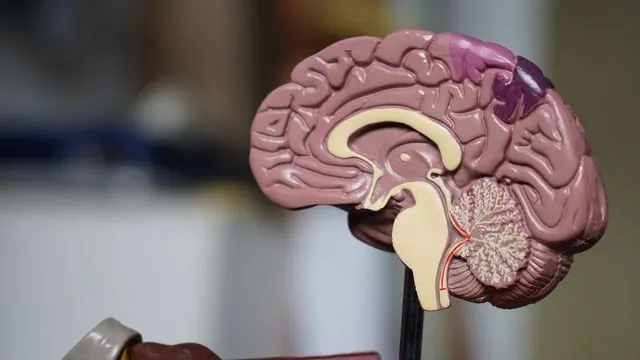
Shocking Study Reveals How Type 2 Diabetes May Mimic Early Alzheimer's Disease in the Brain!
2025-03-27
Author: Arjun
Introduction
Recent groundbreaking research from the University of Nevada, Las Vegas (UNLV) suggests that Type 2 diabetes can rewire the brain, creating conditions similar to early Alzheimer’s disease. The study reveals a critical link between high blood sugar levels and the anterior cingulate cortex (ACC), a vital area of the brain governing cognitive function.
Link Between Type 2 Diabetes and Alzheimer’s Disease
Type 2 diabetes, characterized by abnormal insulin and blood sugar levels, has long been known to increase the risk of various psychiatric and neurodegenerative disorders. Alarmingly, diabetes patients are 65% more likely to develop Alzheimer’s disease. However, the specific connections between these two conditions have remained largely unexplored—until now.
Research Findings
In their newly published findings in the Journal of Neuroscience, the UNLV team has discovered that diabetes diminishes the ACC's functionality. This suppression may hinder reward perception and memory signals, leading to mild cognitive impairments akin to those seen in the early stages of Alzheimer’s disease.
Lead researcher James Hyman, a psychology professor at UNLV, stated that “diabetes may be altering the brain similarly to early stages of Alzheimer’s disease.” He emphasizes the need for further research, as these insights could pave the way for more effective diagnostic and therapeutic strategies targeting both diabetes and Alzheimer’s.
Exploring the Role of the ACC
This study builds upon previous UNLV research examining the link between diabetes and Alzheimer’s and represents a pioneering investigation into the role of the ACC. The ACC is crucial for managing cognitive processes, from motivation and decision-making to emotional regulation. Dysfunction in this region can exacerbate mood disorders and depression, adding another layer of complexity to the relationship between diabetes and cognitive decline.
Methodology and Observations
Utilizing rodent models to observe the ACC's responses to high blood sugar levels, the researchers noted that diabetic subjects displayed a heightened anticipation for rewards—such as tasty treats—compared to their healthy counterparts. However, after enjoying the reward, diabetic subjects quickly moved on without savoring the experience, unlike healthy subjects who took time to appreciate it.
Impact on Memory and Learning
The research indicates that abnormal insulin levels in diabetic models may impair the ACC's ability to process reward-related information, weakening its connection to the hippocampus—a brain area crucial for memory and learning associated with Alzheimer’s disease.
Hyman explained that while the hippocampus provides situational awareness, the ACC helps individuals recognize rewarding experiences. In individuals with Type 2 diabetes, this integrated processing breaks down, leading to difficulties in recalling rewarding experiences in specific locations.
Global Implications of the Research
With approximately 10% of the global population battling diabetes—predominantly Type 2—this research carries profound implications. Type 2 diabetes, closely linked to obesity, can lead to significant long-term damage to vital organs and tissues.
Potential Therapeutic Targets
Moreover, the findings from the UNLV team suggest that the hippocampus-to-ACC connection may serve as a potential target for treating mood disorders, which have been correlated with ACC dysfunction. The study highlighted a notable link between muted reward processing and anhedonia, a symptom common in both depression and Type 2 diabetes, suggesting that addressing this dysfunction could offer therapeutic benefits.
Future Research Directions
As they continue to investigate the associations between neurodegenerative diseases and ACC impairment, Hyman pointed out that Alzheimer’s can often go undetected for years, as the brain compensates for early changes in information processing. “Before diagnosis, people often behave normally despite underlying issues. We even observed this in our study,” he remarked.
Conclusion
This research not only sheds light on the link between Type 2 diabetes and early Alzheimer’s but also emphasizes the importance of managing diabetes through lifestyle and dietary interventions. As we dig deeper into the impact of diabetes on cognitive functions, it raises urgent questions about how we approach treatment and prevention strategies for both conditions in the future.
Stay tuned for updates on this significant research—understanding the brain's response to diabetes could change everything!


 Brasil (PT)
Brasil (PT)
 Canada (EN)
Canada (EN)
 Chile (ES)
Chile (ES)
 Česko (CS)
Česko (CS)
 대한민국 (KO)
대한민국 (KO)
 España (ES)
España (ES)
 France (FR)
France (FR)
 Hong Kong (EN)
Hong Kong (EN)
 Italia (IT)
Italia (IT)
 日本 (JA)
日本 (JA)
 Magyarország (HU)
Magyarország (HU)
 Norge (NO)
Norge (NO)
 Polska (PL)
Polska (PL)
 Schweiz (DE)
Schweiz (DE)
 Singapore (EN)
Singapore (EN)
 Sverige (SV)
Sverige (SV)
 Suomi (FI)
Suomi (FI)
 Türkiye (TR)
Türkiye (TR)
 الإمارات العربية المتحدة (AR)
الإمارات العربية المتحدة (AR)